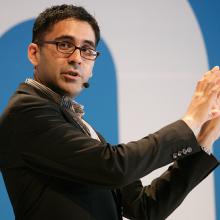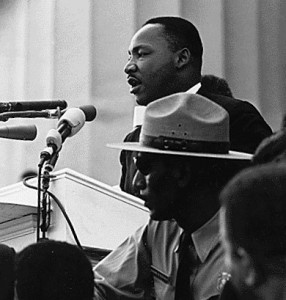1968
I walked through ash and glass as neighbors and community members swept up the remnants of our neighborhood. The night before, flames touched sky in all corners of our city as news and police helicopters hovered overhead. The city was Los Angeles. The year was 1992, and it was the third day after the police who beat Rodney King were acquitted by an overwhelmingly white jury in Simi Valley.
That was the day I was introduced to the words of Jeremiah 29:7: “But seek the peace of the city where I have sent you into exile, and pray to the Lord on its behalf, for in its peace you will find your peace.”
On Monday, Maryland Gov. Larry Hogan called in the National Guard and Baltimore Mayor Stephanie Rawlings-Blake declared a citywide curfew to quell violence that erupted in Monument City following the funeral of 25-year-old Freddie Gray. Gray died a week after sustaining a nearly severed spinal cord after being detained by police on April 12. The reason for the stop? Gray ran after making eye contact with police. An investigation is ongoing — while the people of Baltimore and beyond demand justice.
The images of fires rising over the Baltimore landscape were eerie, as it was only a few months ago that the nation sat glued to television sets watching the small town of Ferguson, Mo., erupt. And I fear we are becoming numb to it. We turn the TV on to watch our favorite reality show. We see chanting, running black people, and we think: again? Then we turn back to The Voice.

Umair Haque speaking at the 2009 NEXT conference in Berlin. Via Wylio http://bit.ly/AugRQB
If you’re on Twitter, you may well have a few people that you follow with such enthusiasm that it occasionally feels a little like you’re stalking them. You re-tweet every article they post, nod along with every inspiring tweet they type and include them in your Follow Friday list every week.
Even if that’s not true for you, it’s certainly true for me of one person in particular — Umair Haque.
Haque is a self-titled “author, blogger, thinker, reformer.” But the more I read of his work, the more inclined I am to add the title “prophet” to that list of descriptors.
Haque is a prophet in the sense that he is preaching a message that is for a specific group of people (those who are disenfranchised but not quite cynical enough to give up yet) at a specific point in time (now, in a time of economic malaise). His words cut right to the heart of what has been going wrong in our world, and they are words that many, many people need to hear.
So it was with great relish that I purchased his new digital book, Betterness: Economics for Humans, excited to hear these words.
 At the dedication ceremony for the Martin Luther King, Jr. Memorial, at least two speakers -- the Rev. Bernice King, Martin Luther King's daughter, and the Rev. Jesse Jackson, one of King's lieutenants -- reminded us that at the end of King's life he was planning the Poor People's March
At the dedication ceremony for the Martin Luther King, Jr. Memorial, at least two speakers -- the Rev. Bernice King, Martin Luther King's daughter, and the Rev. Jesse Jackson, one of King's lieutenants -- reminded us that at the end of King's life he was planning the Poor People's March
The Poor People's March is an ancestor to the current Occupy Wall Street movement that we see breaking out across the globe today. The idea was to bring poor people from across the color line -- white, black, brown, red, yellow -- to Washington to call attention to the importance of economic justice. King understood that economic justice -- distributive justice -- was not a matter of race in the United States.
It was true then, and it is true now that African Americans and Latino/as suffer disproportionately from income inequality. But it is important to remember that people of all colors suffer from the corrosive effects of income inequality. Some of the poorest communities in the country are European American. The poorest states in the United States with some of the worse educational and health care outcomes are states in the former confederacy.
Income inequality has increased since 1968. So the question that insists upon being answer is this: Why has income inequality worsened between 1968 and today?
